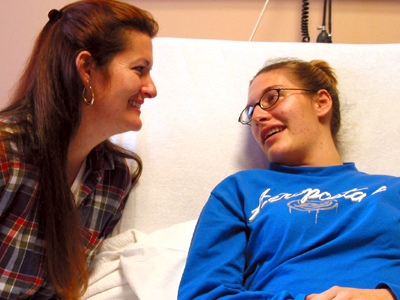JACKSON, Miss.—Rhonda Dedeaux of Kiln burst into the emergency room at Forrest General Hospital in Hattiesburg fearing the worst.
Her 18-year-old daughter LaKrisha had crashed her car, and news from the wreck site wasn’t good. “A Highway Patrol officer told my husband Ricky to get to the hospital now!’”
Dedeaux said when she first saw LaKrisha, “I thought she was fine. She didn’t have a scratch on her.” But a head scan revealed LaKrisha’s brain was bruised and bleeding. And Dedeaux said she knew enough about that diagnosis to be afraid of what might be ahead.
“My brother was brain-injured in a construction accident, and he went back to the baby stage for awhile. My thoughts were: ‘Are we going to go through that?’ Will she be able to be herself again?’ ”
Today, the happy news is that LaKrisha is on the mend. And while she’s not where she wants to be—back at school at Pearl River Community College in Poplarville—she concedes: “I’ve come a long way. They showed me all the stuff I wrote and drew (while in the hospital) and it’s pitiful.”
After undergoing brain surgery at Forrest General, LaKrisha transferred to Methodist Rehabilitation Center in Jackson. Her mom believes that the 21 days she spent in therapy there played a key role in her recovery. “We were told Methodist was the best as far as brain injury rehab and we thank God for it,” she said.
Methodist is one of only 16 hospitals in the nation to be named a Traumatic Brain Injury Model System site by the National Institute on Disability and Rehabilitation Research. As such, the 124-bed non-profit hospital is on the forefront of research designed to improve outcomes for brain injury survivors.
“We are one of the sites where the researchers also treat patients, which we think is an advantage,” said Dr. Mark Sherer, director of neuropsychology at Methodist and project director for the Traumatic Brain Injury Model System of Mississippi. “We study what patients and their families tell us they are concerned about.”
A case in point is Methodist’s current focus on acute confusion, a condition that LaKrisha experienced in the early days after her injury. “She never knew where she was at,” said her mom. “She kept asking ‘Why am I here?’ We went over the wreck hundreds of times.”
Sherer said Methodist is conducting several studies related to confusion, including a medication trial and an examination of the specific clusters of behavior associated with the condition. “By having a better understanding of these patterns we hope to be able to predict who will respond better to different types of medicine,” he said.
Confusion has traditionally been linked to memory lapses and disorientation, but the condition is actually associated with a broad array of symptoms. The Confusion Assessment Protocol—a test developed at Methodist and used around the world—focuses on seven: disorientation, cognitive impairment, restlessness, fluctuation in presentation, sleep disturbances, decreased level of daytime arousal and psychotic type behaviors such as delusions or hallucinations.
After using the CAP to assess a patient’s confusion, Methodist researchers are able to educate families on what to expect. Dr. Risa Nakase-Thompson, a neuropsychologist at Methodist, said that knowledge is often a comfort to the families of patients who exhibit the more extreme symptoms of confusion. “When patients have hallucinations, variable displays of emotion, restlessness and episodes of violence, their families become particularly concerned about their long-term recovery. Because of our research, we can provide firsthand knowledge of how patients like this improve during hospitalization and later on.”
Dr. Nakase-Thompson said most patients get through the confusion stage before leaving Methodist. LaKrisha’s cleared after her first week in rehab, which was a great relief to her parents.
Dedeaux said during the days when LaKrisha couldn’t even remember what year it was, “I was back and forth wondering what the next day held for us. There were times I wondered if this was what she would be like the rest of her life. But in the back of my mind, I knew better.”
Once LaKrisha became more clear-headed, Dedeaux said she began wowing therapists with her rapid progress. “The first week her balance and walking was scored at a 19 and her therapist wrote that she hoped she would gain six points. The next week she was a 51.”
When LaKrisha gets back to her studies, she hopes to pursue a nursing degree. In the meantime, she can say she’s already played a role in improving the lives of others who sustain brain injuries, says Dr. Stuart Yablon, medical director of the Methodist’s brain injury program and project medical director for the Traumatic Brain Injury Model System of Mississippi.
“I believe the most important benefit of participation in the TBI Model Systems Project isn't actually made to the individual patient that is participating. Instead, the contribution is made to other individuals who will sustain such injuries at a later time. All of us, whether we have sustained a TBI or any other medical condition, are beneficiaries of the medical lessons learned from the care of people that preceded us. Our TBI Model System patients and their families are each making a significant contribution to the knowledge and care of people like themselves in the future. This societal benefit should not be overlooked, as it is essential for a hope for better outcomes in the years ahead.”

